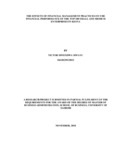| dc.description.abstract | This study sought to examine the effect of financial management practices on the financial performance of Small and Medium Enterprises in Kenya. The study focused on the Top 100 SMEs in Kenya as per the KPMG survey for the year 2017. Financial performance of SMEs was measured by SME’s Return on Asset for the year 2017. Within the study financial management was measured by working capital, dividend policy and capital budgeting decision.
Working capital was measured by the difference between current assets and current liabilities, dividend policy was measured by the dividend pay – out ratio, capital budgeting decisions was measured by a dummy variable of the adoption or failure of adoption of the capital budgeting techniques in investment valuation. On the moderating variable, total assets of the SME was used to measure the size of the business enterprise.
The core findings of the study were that in terms of the relationship among the variables, the Pearson correlation matrix results reveals that working capital has a positive relationship with the firm’s return on assets implying that they move in the same direction. Similarly, capital budgeting was found to have a positive relationship with the firm’s return on assets. The size of the firm was also found to be positively related to the return on asset for the SMEs.
However, dividend policy was found to be negatively related to SMEs’ return on assets implying that the two move in the opposite direction. With regard to empirical model analysis, results posit that that only the working capital and the capital budgeting decision are significant in informing the SMEs’ financial performance as measured by return on
9
assets. Dividend policy was found to have a negative but insignificant effect on SME financial performance.
Therefore, based on the study findings, the study recommends for the need for the SME to take in account policies that enhance effective working capital management to avoid short term illiquidity. Further, the study calls for the SMEs to consider adopting capital budgeting decisions in their investment evaluations and more so strive towards using a mix of techniques for an objective decision making on their capital investment | en_US |



